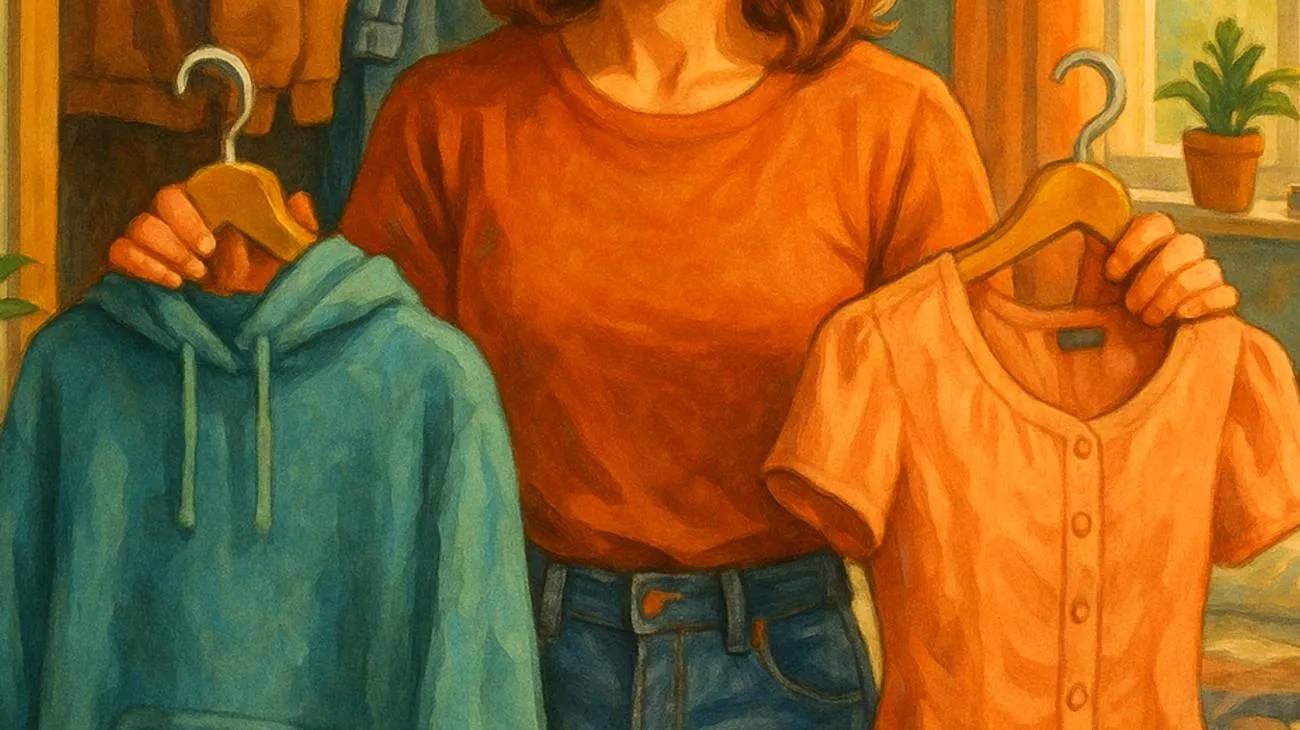Standing in front of your closet this morning, you probably grabbed that oversized hoodie without giving it a second thought. It’s cozy, it’s effortless, and honestly, it just feels right. But what if your favorite baggy clothes are actually telling a story about your emotions that you haven’t even realized you’re writing?
Psychology researchers have uncovered something fascinating about our wardrobes that might make you look at your clothing choices in a completely different light. That consistent preference for oversized, loose-fitting clothes? It might be your mind’s sneaky way of creating emotional armor without you even knowing it’s happening.
Your Closet Is Speaking Psychology
Let’s get one thing straight right off the bat—there’s absolutely nothing wrong with loving oversized clothes. They’re comfortable, they’re stylish, and they can be incredibly empowering. But researchers at the University of Hertfordshire discovered something pretty mind-blowing when they studied the relationship between clothing choices and emotional states.
In their groundbreaking research, they found that women were significantly more likely to reach for baggy clothes and jeans when feeling down or depressed. The numbers are actually shocking: 57% of women reported wearing jeans when feeling sad, compared to just 2% when feeling happy. Even more telling, 62% chose baggy tops when depressed, while only 6% reached for them when in a good mood.
What does this mean exactly? Well, it suggests that our clothing choices aren’t just about fashion or comfort—they’re complex psychological statements we make to ourselves and the world around us. When we’re feeling vulnerable or low, we might unconsciously choose clothes that help us blend into the background rather than stand out.
The Hidden Psychology of Hiding
Psychologists have a term for what might be happening here: avoidance coping. This is when your brain tries to protect you from stress or anxiety by helping you avoid situations or feelings that might be uncomfortable. In this case, oversized clothing can function as what experts call “symbolic self-protection”—using external objects to manage internal anxiety or discomfort about your body or self-image.
Clinical observations have shown that individuals experiencing body dysmorphia or significant body image difficulties often use oversized clothing as a coping mechanism. It’s like creating a physical barrier between themselves and potential criticism or unwanted attention. Fashion experts who work with students have noted that some people become so accustomed to wearing oversized outfits that they experience genuine psychological discomfort when wearing more fitted clothes.
The really fascinating part? Most people doing this aren’t even aware of it. They genuinely believe they’re just choosing comfort over style, not realizing that there might be deeper emotional motivations driving these decisions.
When Comfort Becomes a Security Blanket
There’s a crucial difference between choosing oversized clothes because you love the style and using them as emotional armor. The key indicator isn’t the clothes themselves—it’s the psychological function they’re serving in your life. Are your baggy sweaters and loose jeans making you feel confident and comfortable, or are they helping you hide from the world?
Research indicates that when someone consistently chooses clothing that’s several sizes too large specifically to minimize attention or hide perceived flaws, it might signal underlying insecurity or vulnerability. This becomes particularly concerning when fitted clothing causes significant anxiety or when clothing choices start limiting social or professional opportunities.
Here’s the thing though—this isn’t about judging anyone’s fashion choices. Many people choose loose-fitting garments for cultural, religious, or personal reasons that have nothing to do with insecurity. The context matters enormously when evaluating whether clothing choices represent empowerment or avoidance.
The Empowerment Plot Twist
But wait—there’s another side to this story that completely flips the narrative. For many people, especially women, choosing oversized clothing can actually be an act of rebellion and empowerment. In a world that constantly pressures people to show off their bodies and conform to certain beauty standards, deliberately choosing loose, comfortable garments can be a powerful statement of self-determination.
Fashion and gender scholars argue that rejecting body-focused trends through consciously loose styles is a way of asserting autonomy and refusing to play by society’s rules about how bodies should be displayed. In this context, baggy clothes become a tool of liberation rather than a hiding mechanism.
The crucial difference? Intent and awareness. When someone consciously chooses oversized clothing as a form of self-expression, comfort, or cultural identity, that’s psychologically very different from unconsciously using it as emotional protection.
The Science of Feeling Good in Your Clothes
Researchers have discovered something called enclothed cognition—the idea that what we wear directly impacts our mood, confidence, and even our cognitive performance. In a fascinating 2012 study, participants who wore a lab coat described as a “doctor’s coat” showed better attention than those who wore the same coat but were told it was a “painter’s coat.” The clothing itself was identical, but the psychological meaning changed everything.
This research reveals that our clothes don’t just reflect our inner state—they actually influence it. When someone consistently chooses clothes that make them feel hidden or invisible, it might contribute to lower self-esteem over time. Conversely, when people wear clothes that make them feel confident and authentic—whether that’s a power suit or a comfortable hoodie—it can boost their mood and self-perception.
The goal isn’t to pressure anyone into wearing tight-fitting clothes if that’s not their preference. Instead, it’s about ensuring that your clothing choices are serving your psychological well-being rather than reinforcing negative patterns or helping you avoid dealing with underlying insecurities.
Warning Signs vs. Healthy Choices
So how can you tell if your love for oversized clothes is healthy self-expression or potential avoidance behavior? Psychological research suggests looking out for these patterns:
- Feeling intense anxiety when wearing fitted clothing that shows your actual body shape
- Avoiding social or professional situations because you don’t feel confident in more appropriate attire
- Always choosing the baggiest option regardless of context, even when it’s impractical or inappropriate
- Feeling trapped by your clothing choices rather than empowered by them
- Experiencing genuine distress when circumstances require you to wear more fitted clothes
If these patterns sound familiar, it might be worth exploring whether your wardrobe is serving your authentic self-expression or functioning as a way to avoid dealing with deeper feelings about your body or self-worth.
Finding Your Authentic Style
If you’re reading this and recognizing some of these patterns in your own wardrobe choices, take a deep breath—awareness is actually the first step toward making more intentional decisions about how you present yourself to the world. The beauty of understanding the psychology behind your clothing preferences is that it gives you the power to make choices that truly serve your well-being.
Maybe you realize that you genuinely love oversized clothes because they make you feel confident, comfortable, and authentically you—that’s fantastic, and you should absolutely keep wearing what makes you happy. Or perhaps you discover that you’ve been using your wardrobe as a hiding place without realizing it, and you’re ready to explore some different options that might help you feel more confident and visible.
Remember, there’s no universal “right” way to dress from a psychological standpoint. The goal is simply to ensure that your clothing choices are authentic expressions of who you are, rather than unconscious responses to fear, insecurity, or avoidance. Your wardrobe should be a source of joy and self-expression, not a psychological prison.
Whether you prefer fitted clothes, oversized garments, or a mix of both, the most important thing is that your choices feel authentic and empowering to you. The research on clothing psychology isn’t meant to make you second-guess every outfit—it’s meant to help you understand the powerful relationship between what you wear and how you feel, so you can make choices that support your confidence and well-being.
Your clothes are one of the most immediate ways you communicate with the world every single day. Making sure that communication is intentional, authentic, and aligned with how you want to feel about yourself? That’s when your wardrobe becomes a tool for empowerment rather than concealment, regardless of whether your style runs tight, loose, or somewhere in between.
Table of Contents

